Entrepreneurship and Small Business Management
VerifiedAdded on 2023/01/05
|17
|4614
|23
AI Summary
This report discusses entrepreneurship and different types of entrepreneurial ventures, the impact of micro and small businesses on the economy, and the characteristic traits and skills of successful entrepreneurs. It also explores the importance of small businesses and business start-ups in the growth of the social economy.
Contribute Materials
Your contribution can guide someone’s learning journey. Share your
documents today.

Unit 9 Entrepreneurship and
Small Business Management
Small Business Management
Secure Best Marks with AI Grader
Need help grading? Try our AI Grader for instant feedback on your assignments.
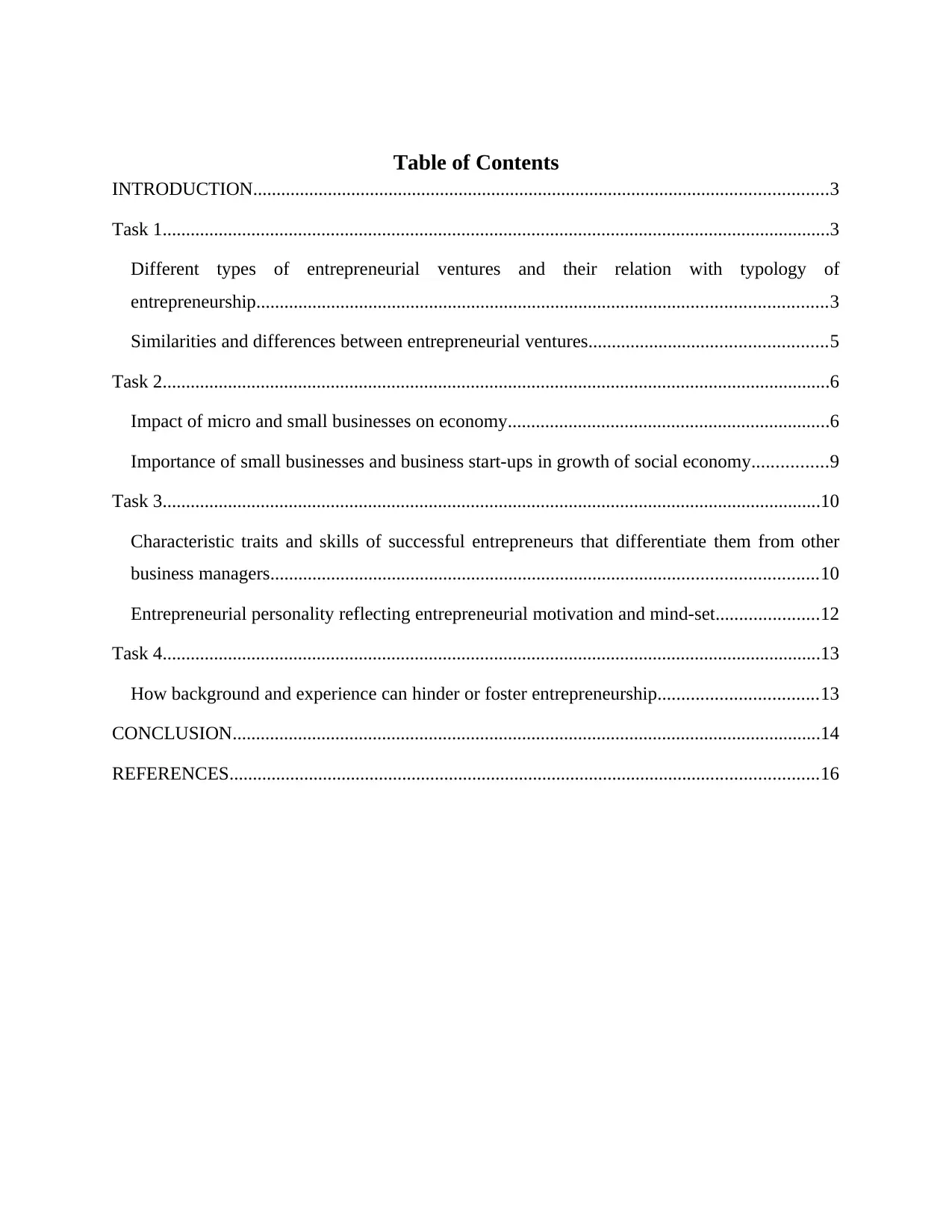
Table of Contents
INTRODUCTION...........................................................................................................................3
Task 1...............................................................................................................................................3
Different types of entrepreneurial ventures and their relation with typology of
entrepreneurship..........................................................................................................................3
Similarities and differences between entrepreneurial ventures...................................................5
Task 2...............................................................................................................................................6
Impact of micro and small businesses on economy.....................................................................6
Importance of small businesses and business start-ups in growth of social economy................9
Task 3.............................................................................................................................................10
Characteristic traits and skills of successful entrepreneurs that differentiate them from other
business managers.....................................................................................................................10
Entrepreneurial personality reflecting entrepreneurial motivation and mind-set......................12
Task 4.............................................................................................................................................13
How background and experience can hinder or foster entrepreneurship..................................13
CONCLUSION..............................................................................................................................14
REFERENCES..............................................................................................................................16
INTRODUCTION...........................................................................................................................3
Task 1...............................................................................................................................................3
Different types of entrepreneurial ventures and their relation with typology of
entrepreneurship..........................................................................................................................3
Similarities and differences between entrepreneurial ventures...................................................5
Task 2...............................................................................................................................................6
Impact of micro and small businesses on economy.....................................................................6
Importance of small businesses and business start-ups in growth of social economy................9
Task 3.............................................................................................................................................10
Characteristic traits and skills of successful entrepreneurs that differentiate them from other
business managers.....................................................................................................................10
Entrepreneurial personality reflecting entrepreneurial motivation and mind-set......................12
Task 4.............................................................................................................................................13
How background and experience can hinder or foster entrepreneurship..................................13
CONCLUSION..............................................................................................................................14
REFERENCES..............................................................................................................................16
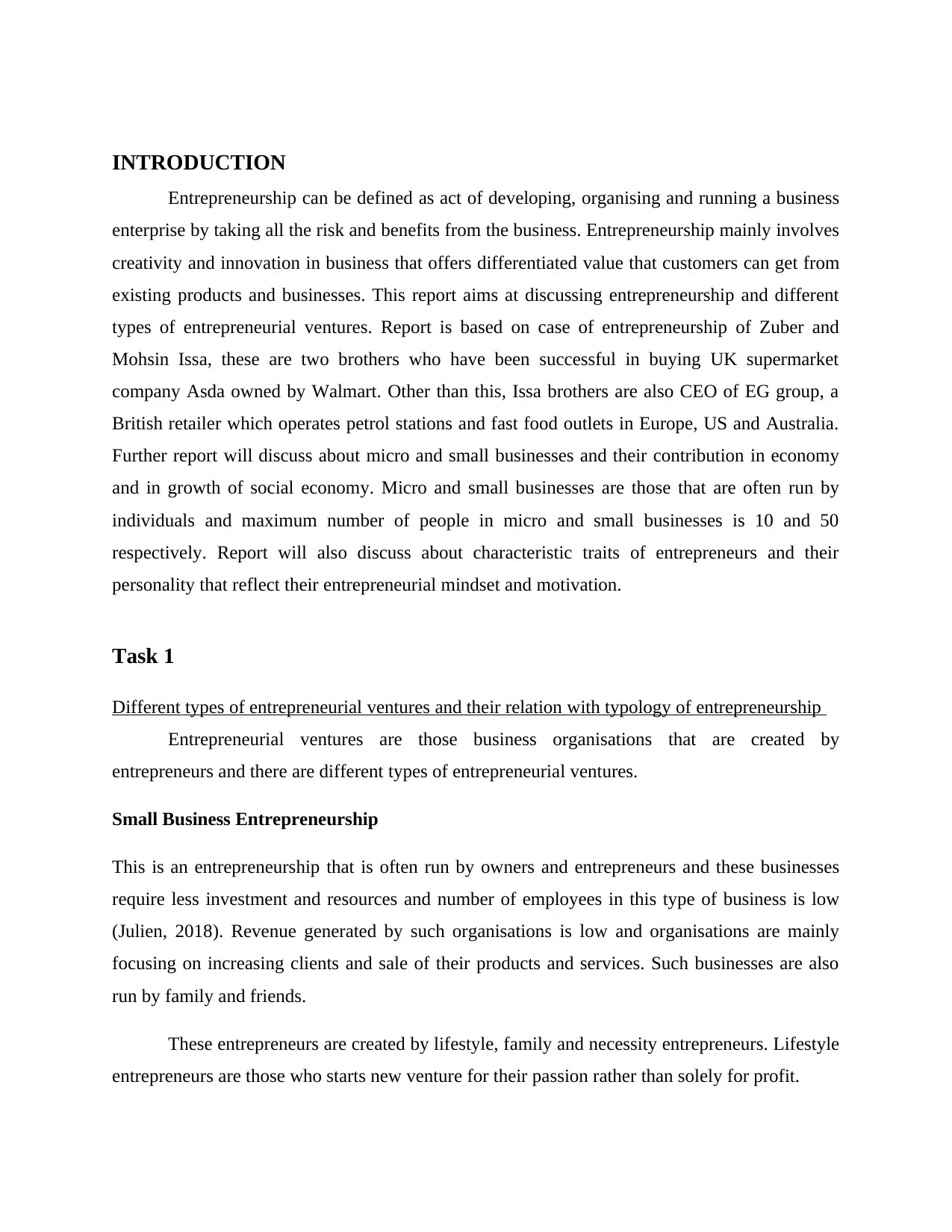
INTRODUCTION
Entrepreneurship can be defined as act of developing, organising and running a business
enterprise by taking all the risk and benefits from the business. Entrepreneurship mainly involves
creativity and innovation in business that offers differentiated value that customers can get from
existing products and businesses. This report aims at discussing entrepreneurship and different
types of entrepreneurial ventures. Report is based on case of entrepreneurship of Zuber and
Mohsin Issa, these are two brothers who have been successful in buying UK supermarket
company Asda owned by Walmart. Other than this, Issa brothers are also CEO of EG group, a
British retailer which operates petrol stations and fast food outlets in Europe, US and Australia.
Further report will discuss about micro and small businesses and their contribution in economy
and in growth of social economy. Micro and small businesses are those that are often run by
individuals and maximum number of people in micro and small businesses is 10 and 50
respectively. Report will also discuss about characteristic traits of entrepreneurs and their
personality that reflect their entrepreneurial mindset and motivation.
Task 1
Different types of entrepreneurial ventures and their relation with typology of entrepreneurship
Entrepreneurial ventures are those business organisations that are created by
entrepreneurs and there are different types of entrepreneurial ventures.
Small Business Entrepreneurship
This is an entrepreneurship that is often run by owners and entrepreneurs and these businesses
require less investment and resources and number of employees in this type of business is low
(Julien, 2018). Revenue generated by such organisations is low and organisations are mainly
focusing on increasing clients and sale of their products and services. Such businesses are also
run by family and friends.
These entrepreneurs are created by lifestyle, family and necessity entrepreneurs. Lifestyle
entrepreneurs are those who starts new venture for their passion rather than solely for profit.
Entrepreneurship can be defined as act of developing, organising and running a business
enterprise by taking all the risk and benefits from the business. Entrepreneurship mainly involves
creativity and innovation in business that offers differentiated value that customers can get from
existing products and businesses. This report aims at discussing entrepreneurship and different
types of entrepreneurial ventures. Report is based on case of entrepreneurship of Zuber and
Mohsin Issa, these are two brothers who have been successful in buying UK supermarket
company Asda owned by Walmart. Other than this, Issa brothers are also CEO of EG group, a
British retailer which operates petrol stations and fast food outlets in Europe, US and Australia.
Further report will discuss about micro and small businesses and their contribution in economy
and in growth of social economy. Micro and small businesses are those that are often run by
individuals and maximum number of people in micro and small businesses is 10 and 50
respectively. Report will also discuss about characteristic traits of entrepreneurs and their
personality that reflect their entrepreneurial mindset and motivation.
Task 1
Different types of entrepreneurial ventures and their relation with typology of entrepreneurship
Entrepreneurial ventures are those business organisations that are created by
entrepreneurs and there are different types of entrepreneurial ventures.
Small Business Entrepreneurship
This is an entrepreneurship that is often run by owners and entrepreneurs and these businesses
require less investment and resources and number of employees in this type of business is low
(Julien, 2018). Revenue generated by such organisations is low and organisations are mainly
focusing on increasing clients and sale of their products and services. Such businesses are also
run by family and friends.
These entrepreneurs are created by lifestyle, family and necessity entrepreneurs. Lifestyle
entrepreneurs are those who starts new venture for their passion rather than solely for profit.
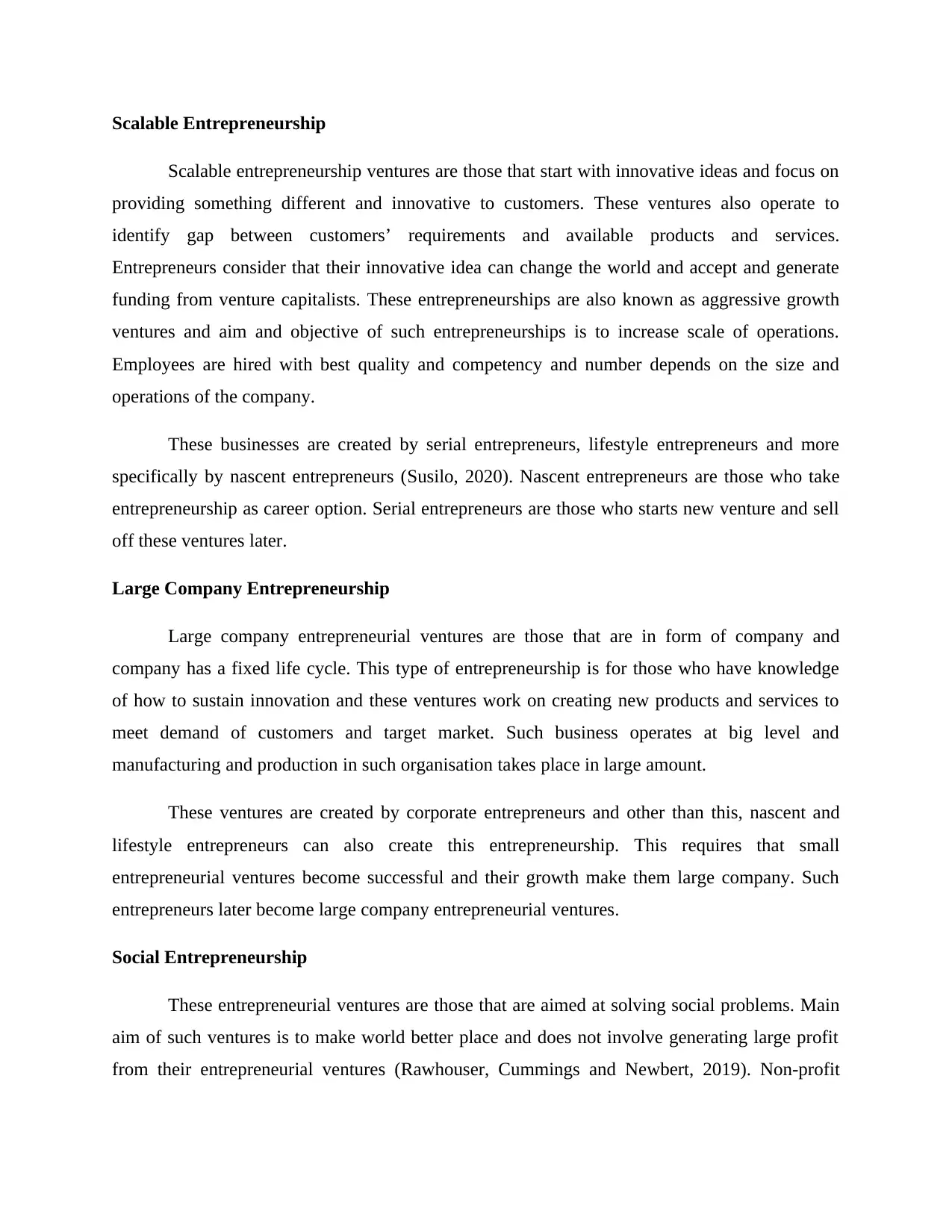
Scalable Entrepreneurship
Scalable entrepreneurship ventures are those that start with innovative ideas and focus on
providing something different and innovative to customers. These ventures also operate to
identify gap between customers’ requirements and available products and services.
Entrepreneurs consider that their innovative idea can change the world and accept and generate
funding from venture capitalists. These entrepreneurships are also known as aggressive growth
ventures and aim and objective of such entrepreneurships is to increase scale of operations.
Employees are hired with best quality and competency and number depends on the size and
operations of the company.
These businesses are created by serial entrepreneurs, lifestyle entrepreneurs and more
specifically by nascent entrepreneurs (Susilo, 2020). Nascent entrepreneurs are those who take
entrepreneurship as career option. Serial entrepreneurs are those who starts new venture and sell
off these ventures later.
Large Company Entrepreneurship
Large company entrepreneurial ventures are those that are in form of company and
company has a fixed life cycle. This type of entrepreneurship is for those who have knowledge
of how to sustain innovation and these ventures work on creating new products and services to
meet demand of customers and target market. Such business operates at big level and
manufacturing and production in such organisation takes place in large amount.
These ventures are created by corporate entrepreneurs and other than this, nascent and
lifestyle entrepreneurs can also create this entrepreneurship. This requires that small
entrepreneurial ventures become successful and their growth make them large company. Such
entrepreneurs later become large company entrepreneurial ventures.
Social Entrepreneurship
These entrepreneurial ventures are those that are aimed at solving social problems. Main
aim of such ventures is to make world better place and does not involve generating large profit
from their entrepreneurial ventures (Rawhouser, Cummings and Newbert, 2019). Non-profit
Scalable entrepreneurship ventures are those that start with innovative ideas and focus on
providing something different and innovative to customers. These ventures also operate to
identify gap between customers’ requirements and available products and services.
Entrepreneurs consider that their innovative idea can change the world and accept and generate
funding from venture capitalists. These entrepreneurships are also known as aggressive growth
ventures and aim and objective of such entrepreneurships is to increase scale of operations.
Employees are hired with best quality and competency and number depends on the size and
operations of the company.
These businesses are created by serial entrepreneurs, lifestyle entrepreneurs and more
specifically by nascent entrepreneurs (Susilo, 2020). Nascent entrepreneurs are those who take
entrepreneurship as career option. Serial entrepreneurs are those who starts new venture and sell
off these ventures later.
Large Company Entrepreneurship
Large company entrepreneurial ventures are those that are in form of company and
company has a fixed life cycle. This type of entrepreneurship is for those who have knowledge
of how to sustain innovation and these ventures work on creating new products and services to
meet demand of customers and target market. Such business operates at big level and
manufacturing and production in such organisation takes place in large amount.
These ventures are created by corporate entrepreneurs and other than this, nascent and
lifestyle entrepreneurs can also create this entrepreneurship. This requires that small
entrepreneurial ventures become successful and their growth make them large company. Such
entrepreneurs later become large company entrepreneurial ventures.
Social Entrepreneurship
These entrepreneurial ventures are those that are aimed at solving social problems. Main
aim of such ventures is to make world better place and does not involve generating large profit
from their entrepreneurial ventures (Rawhouser, Cummings and Newbert, 2019). Non-profit
Secure Best Marks with AI Grader
Need help grading? Try our AI Grader for instant feedback on your assignments.
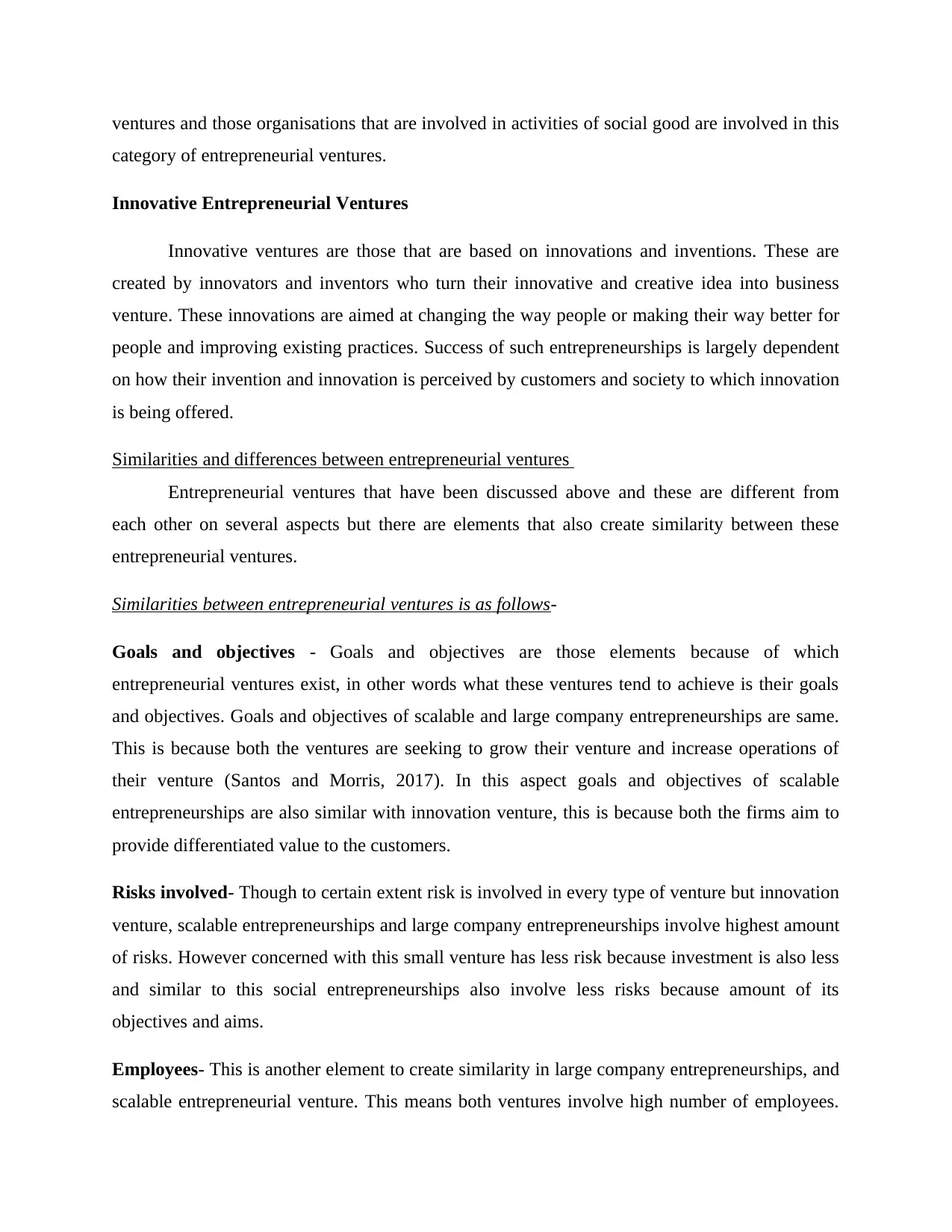
ventures and those organisations that are involved in activities of social good are involved in this
category of entrepreneurial ventures.
Innovative Entrepreneurial Ventures
Innovative ventures are those that are based on innovations and inventions. These are
created by innovators and inventors who turn their innovative and creative idea into business
venture. These innovations are aimed at changing the way people or making their way better for
people and improving existing practices. Success of such entrepreneurships is largely dependent
on how their invention and innovation is perceived by customers and society to which innovation
is being offered.
Similarities and differences between entrepreneurial ventures
Entrepreneurial ventures that have been discussed above and these are different from
each other on several aspects but there are elements that also create similarity between these
entrepreneurial ventures.
Similarities between entrepreneurial ventures is as follows-
Goals and objectives - Goals and objectives are those elements because of which
entrepreneurial ventures exist, in other words what these ventures tend to achieve is their goals
and objectives. Goals and objectives of scalable and large company entrepreneurships are same.
This is because both the ventures are seeking to grow their venture and increase operations of
their venture (Santos and Morris, 2017). In this aspect goals and objectives of scalable
entrepreneurships are also similar with innovation venture, this is because both the firms aim to
provide differentiated value to the customers.
Risks involved- Though to certain extent risk is involved in every type of venture but innovation
venture, scalable entrepreneurships and large company entrepreneurships involve highest amount
of risks. However concerned with this small venture has less risk because investment is also less
and similar to this social entrepreneurships also involve less risks because amount of its
objectives and aims.
Employees- This is another element to create similarity in large company entrepreneurships, and
scalable entrepreneurial venture. This means both ventures involve high number of employees.
category of entrepreneurial ventures.
Innovative Entrepreneurial Ventures
Innovative ventures are those that are based on innovations and inventions. These are
created by innovators and inventors who turn their innovative and creative idea into business
venture. These innovations are aimed at changing the way people or making their way better for
people and improving existing practices. Success of such entrepreneurships is largely dependent
on how their invention and innovation is perceived by customers and society to which innovation
is being offered.
Similarities and differences between entrepreneurial ventures
Entrepreneurial ventures that have been discussed above and these are different from
each other on several aspects but there are elements that also create similarity between these
entrepreneurial ventures.
Similarities between entrepreneurial ventures is as follows-
Goals and objectives - Goals and objectives are those elements because of which
entrepreneurial ventures exist, in other words what these ventures tend to achieve is their goals
and objectives. Goals and objectives of scalable and large company entrepreneurships are same.
This is because both the ventures are seeking to grow their venture and increase operations of
their venture (Santos and Morris, 2017). In this aspect goals and objectives of scalable
entrepreneurships are also similar with innovation venture, this is because both the firms aim to
provide differentiated value to the customers.
Risks involved- Though to certain extent risk is involved in every type of venture but innovation
venture, scalable entrepreneurships and large company entrepreneurships involve highest amount
of risks. However concerned with this small venture has less risk because investment is also less
and similar to this social entrepreneurships also involve less risks because amount of its
objectives and aims.
Employees- This is another element to create similarity in large company entrepreneurships, and
scalable entrepreneurial venture. This means both ventures involve high number of employees.
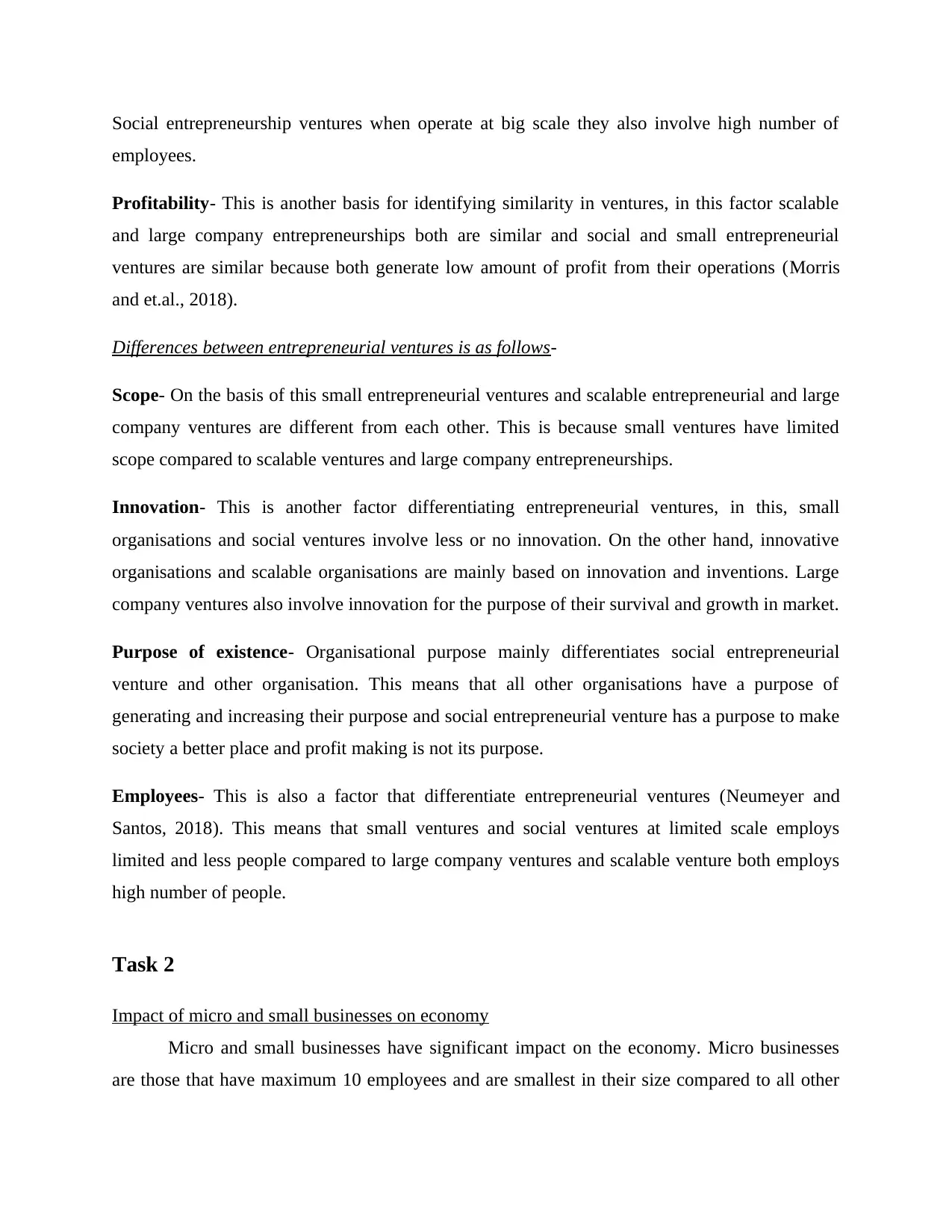
Social entrepreneurship ventures when operate at big scale they also involve high number of
employees.
Profitability- This is another basis for identifying similarity in ventures, in this factor scalable
and large company entrepreneurships both are similar and social and small entrepreneurial
ventures are similar because both generate low amount of profit from their operations (Morris
and et.al., 2018).
Differences between entrepreneurial ventures is as follows-
Scope- On the basis of this small entrepreneurial ventures and scalable entrepreneurial and large
company ventures are different from each other. This is because small ventures have limited
scope compared to scalable ventures and large company entrepreneurships.
Innovation- This is another factor differentiating entrepreneurial ventures, in this, small
organisations and social ventures involve less or no innovation. On the other hand, innovative
organisations and scalable organisations are mainly based on innovation and inventions. Large
company ventures also involve innovation for the purpose of their survival and growth in market.
Purpose of existence- Organisational purpose mainly differentiates social entrepreneurial
venture and other organisation. This means that all other organisations have a purpose of
generating and increasing their purpose and social entrepreneurial venture has a purpose to make
society a better place and profit making is not its purpose.
Employees- This is also a factor that differentiate entrepreneurial ventures (Neumeyer and
Santos, 2018). This means that small ventures and social ventures at limited scale employs
limited and less people compared to large company ventures and scalable venture both employs
high number of people.
Task 2
Impact of micro and small businesses on economy
Micro and small businesses have significant impact on the economy. Micro businesses
are those that have maximum 10 employees and are smallest in their size compared to all other
employees.
Profitability- This is another basis for identifying similarity in ventures, in this factor scalable
and large company entrepreneurships both are similar and social and small entrepreneurial
ventures are similar because both generate low amount of profit from their operations (Morris
and et.al., 2018).
Differences between entrepreneurial ventures is as follows-
Scope- On the basis of this small entrepreneurial ventures and scalable entrepreneurial and large
company ventures are different from each other. This is because small ventures have limited
scope compared to scalable ventures and large company entrepreneurships.
Innovation- This is another factor differentiating entrepreneurial ventures, in this, small
organisations and social ventures involve less or no innovation. On the other hand, innovative
organisations and scalable organisations are mainly based on innovation and inventions. Large
company ventures also involve innovation for the purpose of their survival and growth in market.
Purpose of existence- Organisational purpose mainly differentiates social entrepreneurial
venture and other organisation. This means that all other organisations have a purpose of
generating and increasing their purpose and social entrepreneurial venture has a purpose to make
society a better place and profit making is not its purpose.
Employees- This is also a factor that differentiate entrepreneurial ventures (Neumeyer and
Santos, 2018). This means that small ventures and social ventures at limited scale employs
limited and less people compared to large company ventures and scalable venture both employs
high number of people.
Task 2
Impact of micro and small businesses on economy
Micro and small businesses have significant impact on the economy. Micro businesses
are those that have maximum 10 employees and are smallest in their size compared to all other
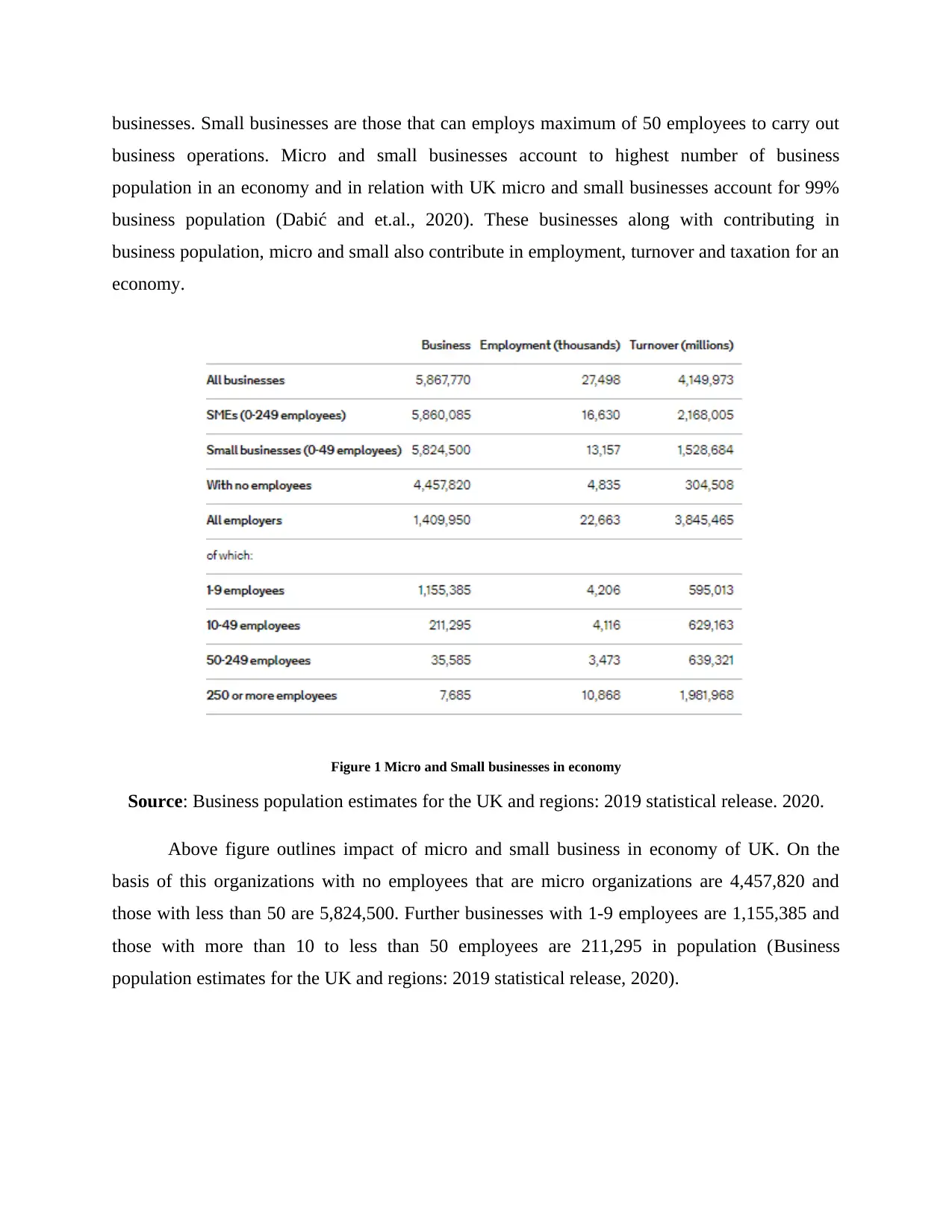
businesses. Small businesses are those that can employs maximum of 50 employees to carry out
business operations. Micro and small businesses account to highest number of business
population in an economy and in relation with UK micro and small businesses account for 99%
business population (Dabić and et.al., 2020). These businesses along with contributing in
business population, micro and small also contribute in employment, turnover and taxation for an
economy.
Figure 1 Micro and Small businesses in economy
Source: Business population estimates for the UK and regions: 2019 statistical release. 2020.
Above figure outlines impact of micro and small business in economy of UK. On the
basis of this organizations with no employees that are micro organizations are 4,457,820 and
those with less than 50 are 5,824,500. Further businesses with 1-9 employees are 1,155,385 and
those with more than 10 to less than 50 employees are 211,295 in population (Business
population estimates for the UK and regions: 2019 statistical release, 2020).
business operations. Micro and small businesses account to highest number of business
population in an economy and in relation with UK micro and small businesses account for 99%
business population (Dabić and et.al., 2020). These businesses along with contributing in
business population, micro and small also contribute in employment, turnover and taxation for an
economy.
Figure 1 Micro and Small businesses in economy
Source: Business population estimates for the UK and regions: 2019 statistical release. 2020.
Above figure outlines impact of micro and small business in economy of UK. On the
basis of this organizations with no employees that are micro organizations are 4,457,820 and
those with less than 50 are 5,824,500. Further businesses with 1-9 employees are 1,155,385 and
those with more than 10 to less than 50 employees are 211,295 in population (Business
population estimates for the UK and regions: 2019 statistical release, 2020).
Paraphrase This Document
Need a fresh take? Get an instant paraphrase of this document with our AI Paraphraser

Source: UK SME Data, Stats & Charts. 2020.
This figure outlines above stated information in form of percentage. Figure outlines that
there are more than 95% businesses are micro businesses. This involves 76% with no employees
and 19.7% with less than 10 employees. Other than this less than 4% businesses are small
businesses. These collectively become more than 98.5% population of UK economy (UK SME
Data, Stats & Charts, 2020).
Figure 3 Growth of Micro and Small Businesses
Source: Number of small and medium-sized enterprises (SMEs) in the United Kingdom (UK)
from 2010 to 2020, by size. 2020.
Figure 2 Micro and small businesses in UK
This figure outlines above stated information in form of percentage. Figure outlines that
there are more than 95% businesses are micro businesses. This involves 76% with no employees
and 19.7% with less than 10 employees. Other than this less than 4% businesses are small
businesses. These collectively become more than 98.5% population of UK economy (UK SME
Data, Stats & Charts, 2020).
Figure 3 Growth of Micro and Small Businesses
Source: Number of small and medium-sized enterprises (SMEs) in the United Kingdom (UK)
from 2010 to 2020, by size. 2020.
Figure 2 Micro and small businesses in UK
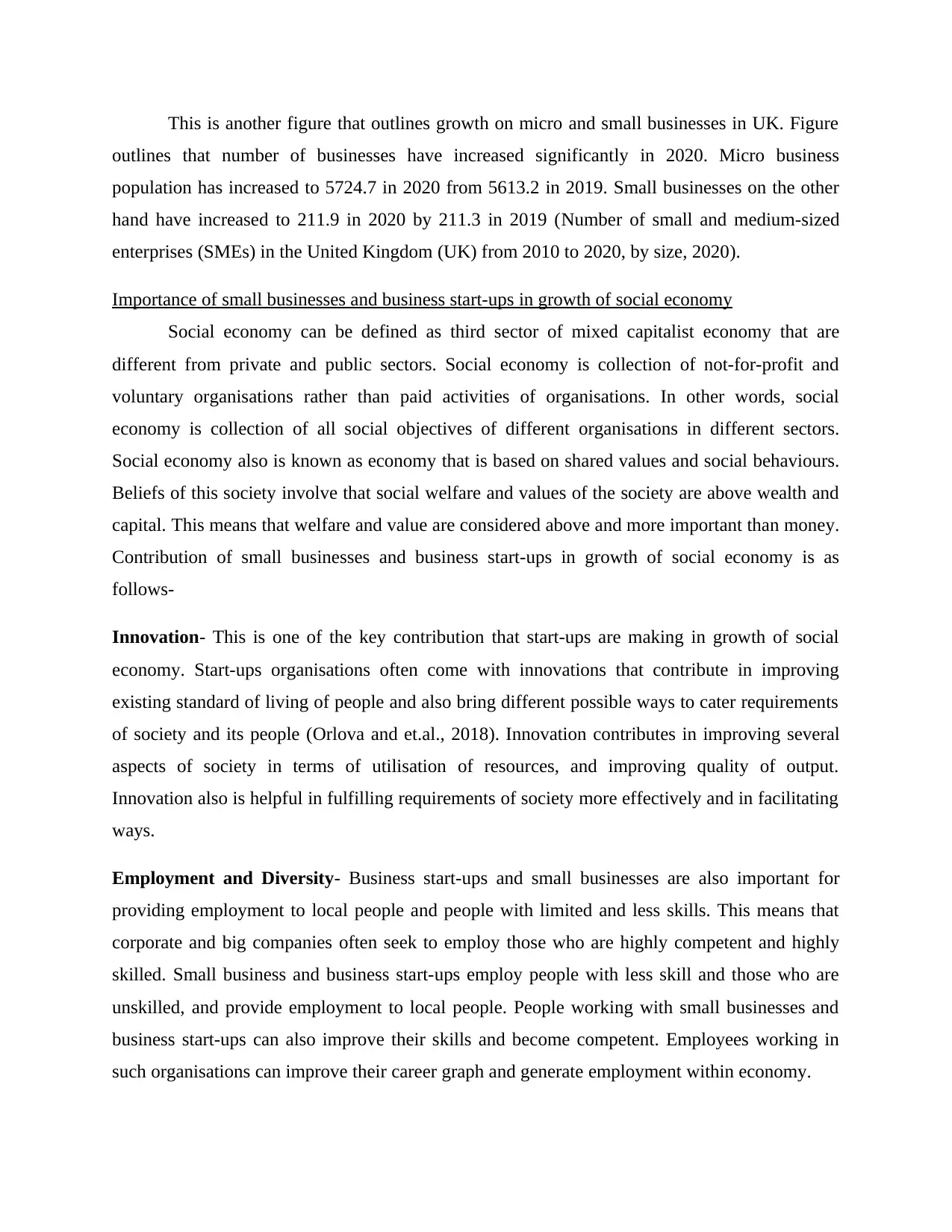
This is another figure that outlines growth on micro and small businesses in UK. Figure
outlines that number of businesses have increased significantly in 2020. Micro business
population has increased to 5724.7 in 2020 from 5613.2 in 2019. Small businesses on the other
hand have increased to 211.9 in 2020 by 211.3 in 2019 (Number of small and medium-sized
enterprises (SMEs) in the United Kingdom (UK) from 2010 to 2020, by size, 2020).
Importance of small businesses and business start-ups in growth of social economy
Social economy can be defined as third sector of mixed capitalist economy that are
different from private and public sectors. Social economy is collection of not-for-profit and
voluntary organisations rather than paid activities of organisations. In other words, social
economy is collection of all social objectives of different organisations in different sectors.
Social economy also is known as economy that is based on shared values and social behaviours.
Beliefs of this society involve that social welfare and values of the society are above wealth and
capital. This means that welfare and value are considered above and more important than money.
Contribution of small businesses and business start-ups in growth of social economy is as
follows-
Innovation- This is one of the key contribution that start-ups are making in growth of social
economy. Start-ups organisations often come with innovations that contribute in improving
existing standard of living of people and also bring different possible ways to cater requirements
of society and its people (Orlova and et.al., 2018). Innovation contributes in improving several
aspects of society in terms of utilisation of resources, and improving quality of output.
Innovation also is helpful in fulfilling requirements of society more effectively and in facilitating
ways.
Employment and Diversity- Business start-ups and small businesses are also important for
providing employment to local people and people with limited and less skills. This means that
corporate and big companies often seek to employ those who are highly competent and highly
skilled. Small business and business start-ups employ people with less skill and those who are
unskilled, and provide employment to local people. People working with small businesses and
business start-ups can also improve their skills and become competent. Employees working in
such organisations can improve their career graph and generate employment within economy.
outlines that number of businesses have increased significantly in 2020. Micro business
population has increased to 5724.7 in 2020 from 5613.2 in 2019. Small businesses on the other
hand have increased to 211.9 in 2020 by 211.3 in 2019 (Number of small and medium-sized
enterprises (SMEs) in the United Kingdom (UK) from 2010 to 2020, by size, 2020).
Importance of small businesses and business start-ups in growth of social economy
Social economy can be defined as third sector of mixed capitalist economy that are
different from private and public sectors. Social economy is collection of not-for-profit and
voluntary organisations rather than paid activities of organisations. In other words, social
economy is collection of all social objectives of different organisations in different sectors.
Social economy also is known as economy that is based on shared values and social behaviours.
Beliefs of this society involve that social welfare and values of the society are above wealth and
capital. This means that welfare and value are considered above and more important than money.
Contribution of small businesses and business start-ups in growth of social economy is as
follows-
Innovation- This is one of the key contribution that start-ups are making in growth of social
economy. Start-ups organisations often come with innovations that contribute in improving
existing standard of living of people and also bring different possible ways to cater requirements
of society and its people (Orlova and et.al., 2018). Innovation contributes in improving several
aspects of society in terms of utilisation of resources, and improving quality of output.
Innovation also is helpful in fulfilling requirements of society more effectively and in facilitating
ways.
Employment and Diversity- Business start-ups and small businesses are also important for
providing employment to local people and people with limited and less skills. This means that
corporate and big companies often seek to employ those who are highly competent and highly
skilled. Small business and business start-ups employ people with less skill and those who are
unskilled, and provide employment to local people. People working with small businesses and
business start-ups can also improve their skills and become competent. Employees working in
such organisations can improve their career graph and generate employment within economy.
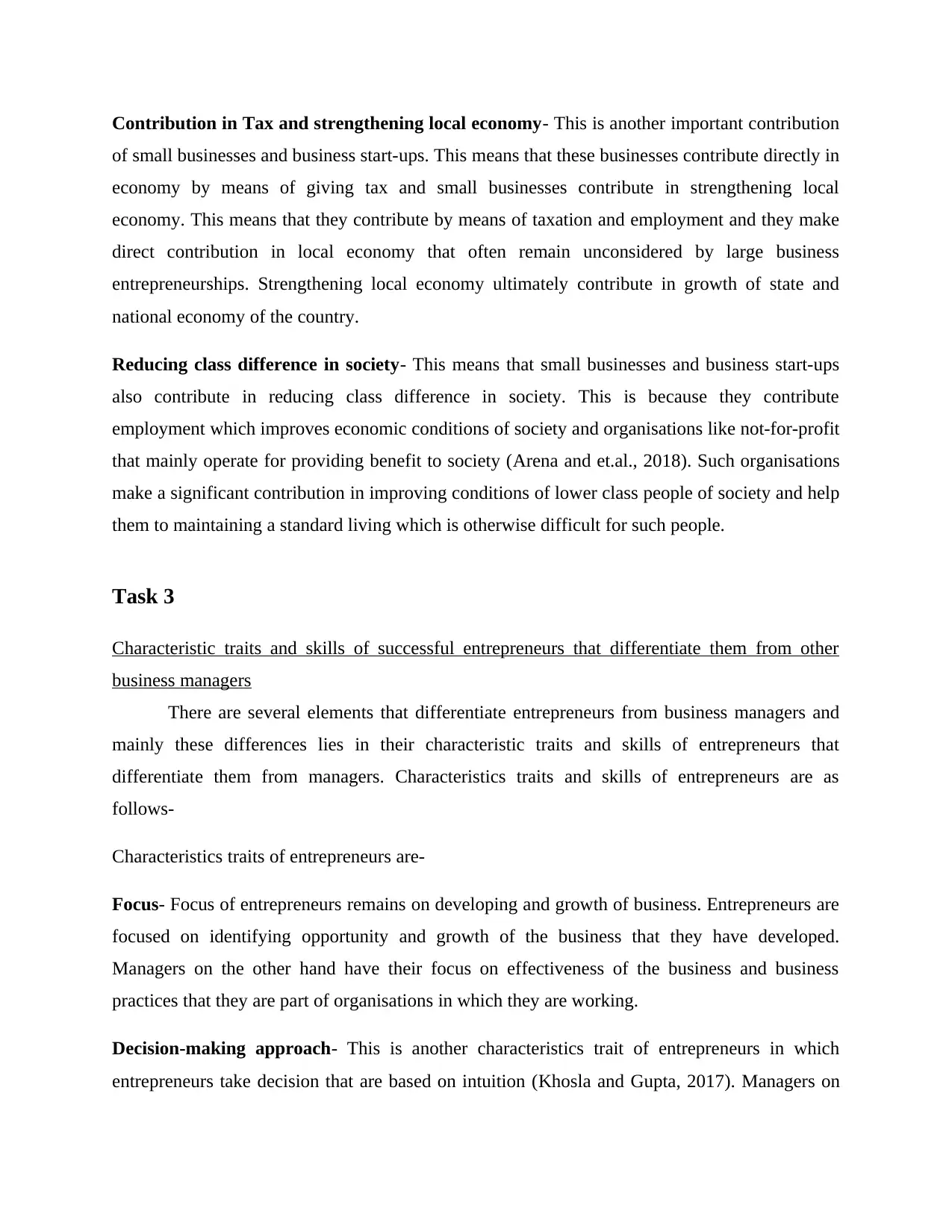
Contribution in Tax and strengthening local economy- This is another important contribution
of small businesses and business start-ups. This means that these businesses contribute directly in
economy by means of giving tax and small businesses contribute in strengthening local
economy. This means that they contribute by means of taxation and employment and they make
direct contribution in local economy that often remain unconsidered by large business
entrepreneurships. Strengthening local economy ultimately contribute in growth of state and
national economy of the country.
Reducing class difference in society- This means that small businesses and business start-ups
also contribute in reducing class difference in society. This is because they contribute
employment which improves economic conditions of society and organisations like not-for-profit
that mainly operate for providing benefit to society (Arena and et.al., 2018). Such organisations
make a significant contribution in improving conditions of lower class people of society and help
them to maintaining a standard living which is otherwise difficult for such people.
Task 3
Characteristic traits and skills of successful entrepreneurs that differentiate them from other
business managers
There are several elements that differentiate entrepreneurs from business managers and
mainly these differences lies in their characteristic traits and skills of entrepreneurs that
differentiate them from managers. Characteristics traits and skills of entrepreneurs are as
follows-
Characteristics traits of entrepreneurs are-
Focus- Focus of entrepreneurs remains on developing and growth of business. Entrepreneurs are
focused on identifying opportunity and growth of the business that they have developed.
Managers on the other hand have their focus on effectiveness of the business and business
practices that they are part of organisations in which they are working.
Decision-making approach- This is another characteristics trait of entrepreneurs in which
entrepreneurs take decision that are based on intuition (Khosla and Gupta, 2017). Managers on
of small businesses and business start-ups. This means that these businesses contribute directly in
economy by means of giving tax and small businesses contribute in strengthening local
economy. This means that they contribute by means of taxation and employment and they make
direct contribution in local economy that often remain unconsidered by large business
entrepreneurships. Strengthening local economy ultimately contribute in growth of state and
national economy of the country.
Reducing class difference in society- This means that small businesses and business start-ups
also contribute in reducing class difference in society. This is because they contribute
employment which improves economic conditions of society and organisations like not-for-profit
that mainly operate for providing benefit to society (Arena and et.al., 2018). Such organisations
make a significant contribution in improving conditions of lower class people of society and help
them to maintaining a standard living which is otherwise difficult for such people.
Task 3
Characteristic traits and skills of successful entrepreneurs that differentiate them from other
business managers
There are several elements that differentiate entrepreneurs from business managers and
mainly these differences lies in their characteristic traits and skills of entrepreneurs that
differentiate them from managers. Characteristics traits and skills of entrepreneurs are as
follows-
Characteristics traits of entrepreneurs are-
Focus- Focus of entrepreneurs remains on developing and growth of business. Entrepreneurs are
focused on identifying opportunity and growth of the business that they have developed.
Managers on the other hand have their focus on effectiveness of the business and business
practices that they are part of organisations in which they are working.
Decision-making approach- This is another characteristics trait of entrepreneurs in which
entrepreneurs take decision that are based on intuition (Khosla and Gupta, 2017). Managers on
Secure Best Marks with AI Grader
Need help grading? Try our AI Grader for instant feedback on your assignments.
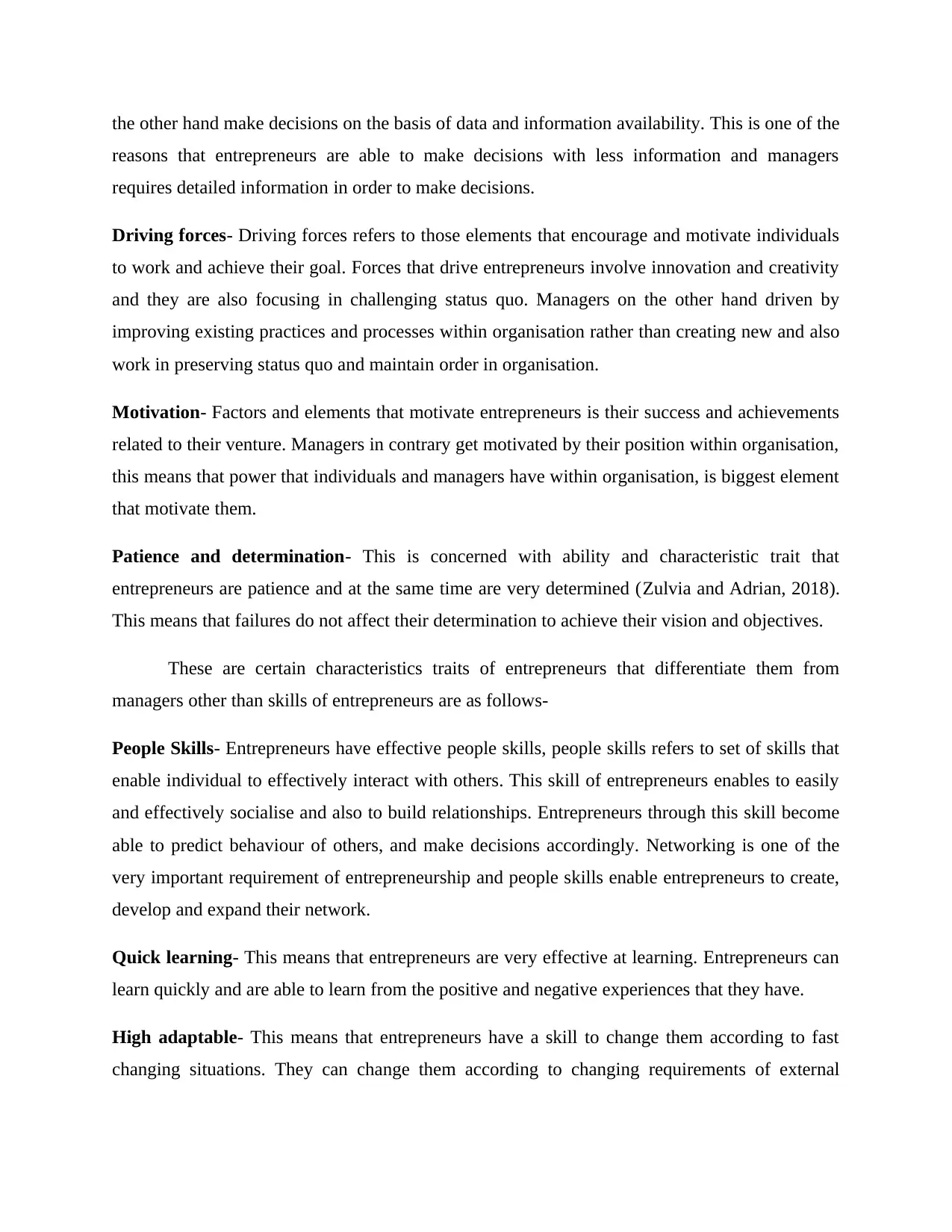
the other hand make decisions on the basis of data and information availability. This is one of the
reasons that entrepreneurs are able to make decisions with less information and managers
requires detailed information in order to make decisions.
Driving forces- Driving forces refers to those elements that encourage and motivate individuals
to work and achieve their goal. Forces that drive entrepreneurs involve innovation and creativity
and they are also focusing in challenging status quo. Managers on the other hand driven by
improving existing practices and processes within organisation rather than creating new and also
work in preserving status quo and maintain order in organisation.
Motivation- Factors and elements that motivate entrepreneurs is their success and achievements
related to their venture. Managers in contrary get motivated by their position within organisation,
this means that power that individuals and managers have within organisation, is biggest element
that motivate them.
Patience and determination- This is concerned with ability and characteristic trait that
entrepreneurs are patience and at the same time are very determined (Zulvia and Adrian, 2018).
This means that failures do not affect their determination to achieve their vision and objectives.
These are certain characteristics traits of entrepreneurs that differentiate them from
managers other than skills of entrepreneurs are as follows-
People Skills- Entrepreneurs have effective people skills, people skills refers to set of skills that
enable individual to effectively interact with others. This skill of entrepreneurs enables to easily
and effectively socialise and also to build relationships. Entrepreneurs through this skill become
able to predict behaviour of others, and make decisions accordingly. Networking is one of the
very important requirement of entrepreneurship and people skills enable entrepreneurs to create,
develop and expand their network.
Quick learning- This means that entrepreneurs are very effective at learning. Entrepreneurs can
learn quickly and are able to learn from the positive and negative experiences that they have.
High adaptable- This means that entrepreneurs have a skill to change them according to fast
changing situations. They can change them according to changing requirements of external
reasons that entrepreneurs are able to make decisions with less information and managers
requires detailed information in order to make decisions.
Driving forces- Driving forces refers to those elements that encourage and motivate individuals
to work and achieve their goal. Forces that drive entrepreneurs involve innovation and creativity
and they are also focusing in challenging status quo. Managers on the other hand driven by
improving existing practices and processes within organisation rather than creating new and also
work in preserving status quo and maintain order in organisation.
Motivation- Factors and elements that motivate entrepreneurs is their success and achievements
related to their venture. Managers in contrary get motivated by their position within organisation,
this means that power that individuals and managers have within organisation, is biggest element
that motivate them.
Patience and determination- This is concerned with ability and characteristic trait that
entrepreneurs are patience and at the same time are very determined (Zulvia and Adrian, 2018).
This means that failures do not affect their determination to achieve their vision and objectives.
These are certain characteristics traits of entrepreneurs that differentiate them from
managers other than skills of entrepreneurs are as follows-
People Skills- Entrepreneurs have effective people skills, people skills refers to set of skills that
enable individual to effectively interact with others. This skill of entrepreneurs enables to easily
and effectively socialise and also to build relationships. Entrepreneurs through this skill become
able to predict behaviour of others, and make decisions accordingly. Networking is one of the
very important requirement of entrepreneurship and people skills enable entrepreneurs to create,
develop and expand their network.
Quick learning- This means that entrepreneurs are very effective at learning. Entrepreneurs can
learn quickly and are able to learn from the positive and negative experiences that they have.
High adaptable- This means that entrepreneurs have a skill to change them according to fast
changing situations. They can change them according to changing requirements of external
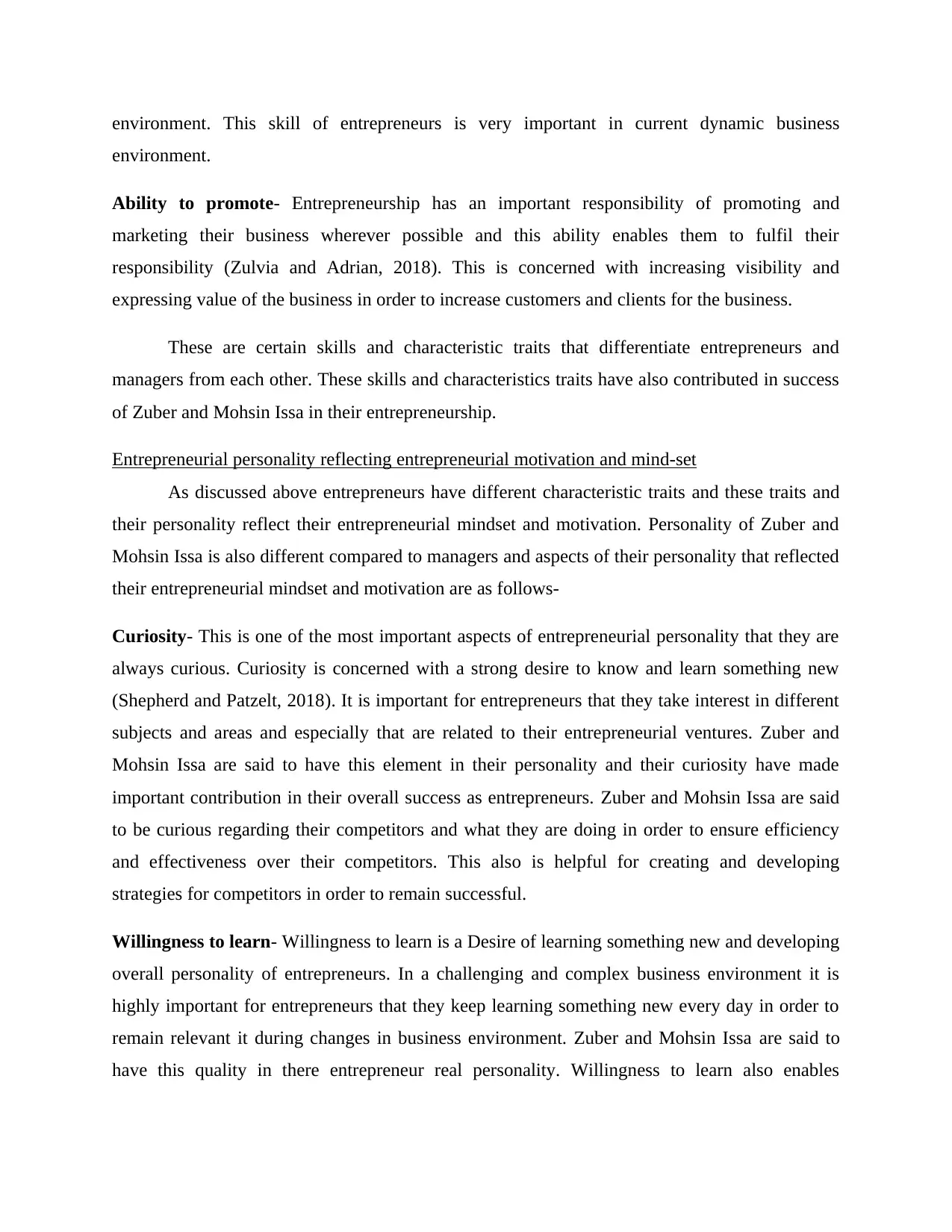
environment. This skill of entrepreneurs is very important in current dynamic business
environment.
Ability to promote- Entrepreneurship has an important responsibility of promoting and
marketing their business wherever possible and this ability enables them to fulfil their
responsibility (Zulvia and Adrian, 2018). This is concerned with increasing visibility and
expressing value of the business in order to increase customers and clients for the business.
These are certain skills and characteristic traits that differentiate entrepreneurs and
managers from each other. These skills and characteristics traits have also contributed in success
of Zuber and Mohsin Issa in their entrepreneurship.
Entrepreneurial personality reflecting entrepreneurial motivation and mind-set
As discussed above entrepreneurs have different characteristic traits and these traits and
their personality reflect their entrepreneurial mindset and motivation. Personality of Zuber and
Mohsin Issa is also different compared to managers and aspects of their personality that reflected
their entrepreneurial mindset and motivation are as follows-
Curiosity- This is one of the most important aspects of entrepreneurial personality that they are
always curious. Curiosity is concerned with a strong desire to know and learn something new
(Shepherd and Patzelt, 2018). It is important for entrepreneurs that they take interest in different
subjects and areas and especially that are related to their entrepreneurial ventures. Zuber and
Mohsin Issa are said to have this element in their personality and their curiosity have made
important contribution in their overall success as entrepreneurs. Zuber and Mohsin Issa are said
to be curious regarding their competitors and what they are doing in order to ensure efficiency
and effectiveness over their competitors. This also is helpful for creating and developing
strategies for competitors in order to remain successful.
Willingness to learn- Willingness to learn is a Desire of learning something new and developing
overall personality of entrepreneurs. In a challenging and complex business environment it is
highly important for entrepreneurs that they keep learning something new every day in order to
remain relevant it during changes in business environment. Zuber and Mohsin Issa are said to
have this quality in there entrepreneur real personality. Willingness to learn also enables
environment.
Ability to promote- Entrepreneurship has an important responsibility of promoting and
marketing their business wherever possible and this ability enables them to fulfil their
responsibility (Zulvia and Adrian, 2018). This is concerned with increasing visibility and
expressing value of the business in order to increase customers and clients for the business.
These are certain skills and characteristic traits that differentiate entrepreneurs and
managers from each other. These skills and characteristics traits have also contributed in success
of Zuber and Mohsin Issa in their entrepreneurship.
Entrepreneurial personality reflecting entrepreneurial motivation and mind-set
As discussed above entrepreneurs have different characteristic traits and these traits and
their personality reflect their entrepreneurial mindset and motivation. Personality of Zuber and
Mohsin Issa is also different compared to managers and aspects of their personality that reflected
their entrepreneurial mindset and motivation are as follows-
Curiosity- This is one of the most important aspects of entrepreneurial personality that they are
always curious. Curiosity is concerned with a strong desire to know and learn something new
(Shepherd and Patzelt, 2018). It is important for entrepreneurs that they take interest in different
subjects and areas and especially that are related to their entrepreneurial ventures. Zuber and
Mohsin Issa are said to have this element in their personality and their curiosity have made
important contribution in their overall success as entrepreneurs. Zuber and Mohsin Issa are said
to be curious regarding their competitors and what they are doing in order to ensure efficiency
and effectiveness over their competitors. This also is helpful for creating and developing
strategies for competitors in order to remain successful.
Willingness to learn- Willingness to learn is a Desire of learning something new and developing
overall personality of entrepreneurs. In a challenging and complex business environment it is
highly important for entrepreneurs that they keep learning something new every day in order to
remain relevant it during changes in business environment. Zuber and Mohsin Issa are said to
have this quality in there entrepreneur real personality. Willingness to learn also enables
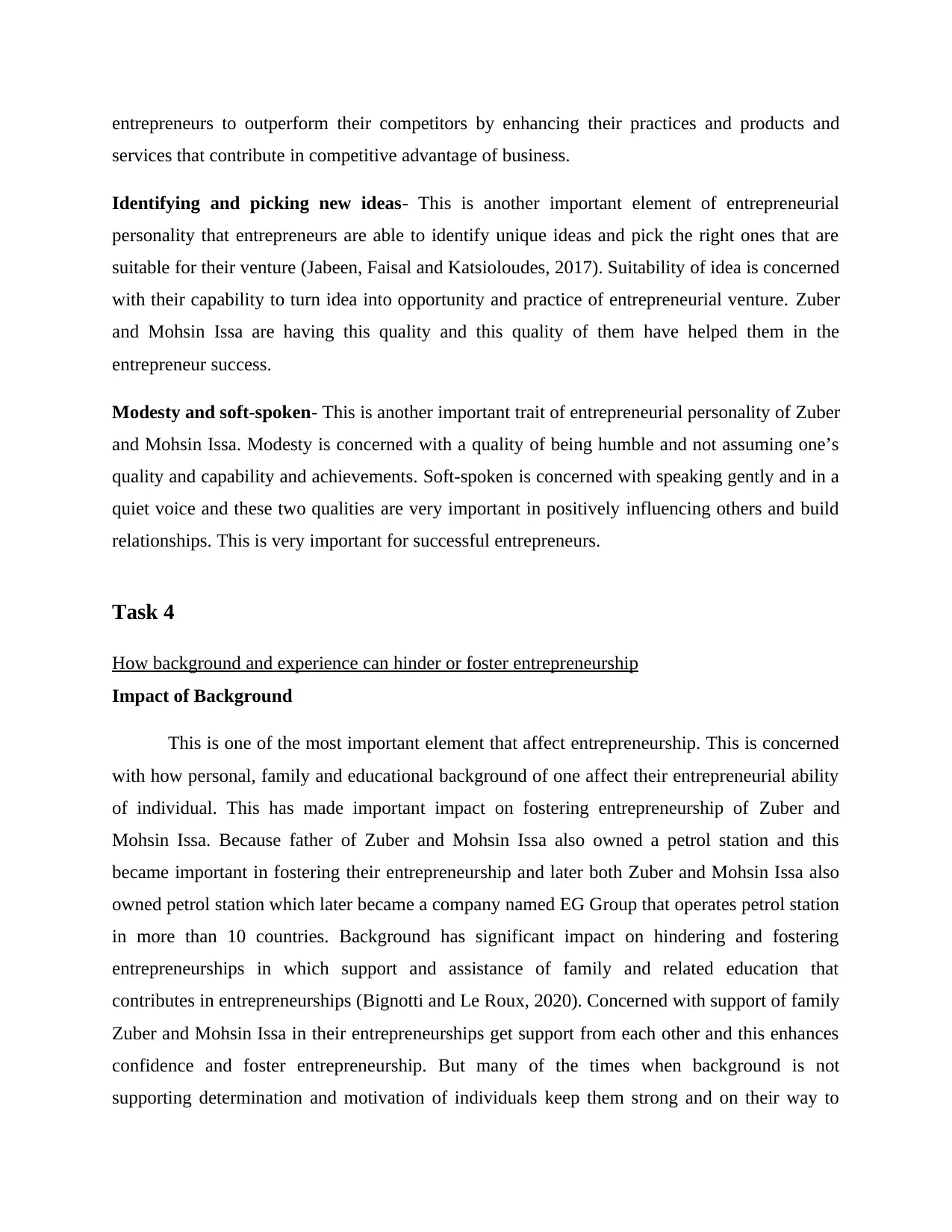
entrepreneurs to outperform their competitors by enhancing their practices and products and
services that contribute in competitive advantage of business.
Identifying and picking new ideas- This is another important element of entrepreneurial
personality that entrepreneurs are able to identify unique ideas and pick the right ones that are
suitable for their venture (Jabeen, Faisal and Katsioloudes, 2017). Suitability of idea is concerned
with their capability to turn idea into opportunity and practice of entrepreneurial venture. Zuber
and Mohsin Issa are having this quality and this quality of them have helped them in the
entrepreneur success.
Modesty and soft-spoken- This is another important trait of entrepreneurial personality of Zuber
and Mohsin Issa. Modesty is concerned with a quality of being humble and not assuming one’s
quality and capability and achievements. Soft-spoken is concerned with speaking gently and in a
quiet voice and these two qualities are very important in positively influencing others and build
relationships. This is very important for successful entrepreneurs.
Task 4
How background and experience can hinder or foster entrepreneurship
Impact of Background
This is one of the most important element that affect entrepreneurship. This is concerned
with how personal, family and educational background of one affect their entrepreneurial ability
of individual. This has made important impact on fostering entrepreneurship of Zuber and
Mohsin Issa. Because father of Zuber and Mohsin Issa also owned a petrol station and this
became important in fostering their entrepreneurship and later both Zuber and Mohsin Issa also
owned petrol station which later became a company named EG Group that operates petrol station
in more than 10 countries. Background has significant impact on hindering and fostering
entrepreneurships in which support and assistance of family and related education that
contributes in entrepreneurships (Bignotti and Le Roux, 2020). Concerned with support of family
Zuber and Mohsin Issa in their entrepreneurships get support from each other and this enhances
confidence and foster entrepreneurship. But many of the times when background is not
supporting determination and motivation of individuals keep them strong and on their way to
services that contribute in competitive advantage of business.
Identifying and picking new ideas- This is another important element of entrepreneurial
personality that entrepreneurs are able to identify unique ideas and pick the right ones that are
suitable for their venture (Jabeen, Faisal and Katsioloudes, 2017). Suitability of idea is concerned
with their capability to turn idea into opportunity and practice of entrepreneurial venture. Zuber
and Mohsin Issa are having this quality and this quality of them have helped them in the
entrepreneur success.
Modesty and soft-spoken- This is another important trait of entrepreneurial personality of Zuber
and Mohsin Issa. Modesty is concerned with a quality of being humble and not assuming one’s
quality and capability and achievements. Soft-spoken is concerned with speaking gently and in a
quiet voice and these two qualities are very important in positively influencing others and build
relationships. This is very important for successful entrepreneurs.
Task 4
How background and experience can hinder or foster entrepreneurship
Impact of Background
This is one of the most important element that affect entrepreneurship. This is concerned
with how personal, family and educational background of one affect their entrepreneurial ability
of individual. This has made important impact on fostering entrepreneurship of Zuber and
Mohsin Issa. Because father of Zuber and Mohsin Issa also owned a petrol station and this
became important in fostering their entrepreneurship and later both Zuber and Mohsin Issa also
owned petrol station which later became a company named EG Group that operates petrol station
in more than 10 countries. Background has significant impact on hindering and fostering
entrepreneurships in which support and assistance of family and related education that
contributes in entrepreneurships (Bignotti and Le Roux, 2020). Concerned with support of family
Zuber and Mohsin Issa in their entrepreneurships get support from each other and this enhances
confidence and foster entrepreneurship. But many of the times when background is not
supporting determination and motivation of individuals keep them strong and on their way to
Paraphrase This Document
Need a fresh take? Get an instant paraphrase of this document with our AI Paraphraser
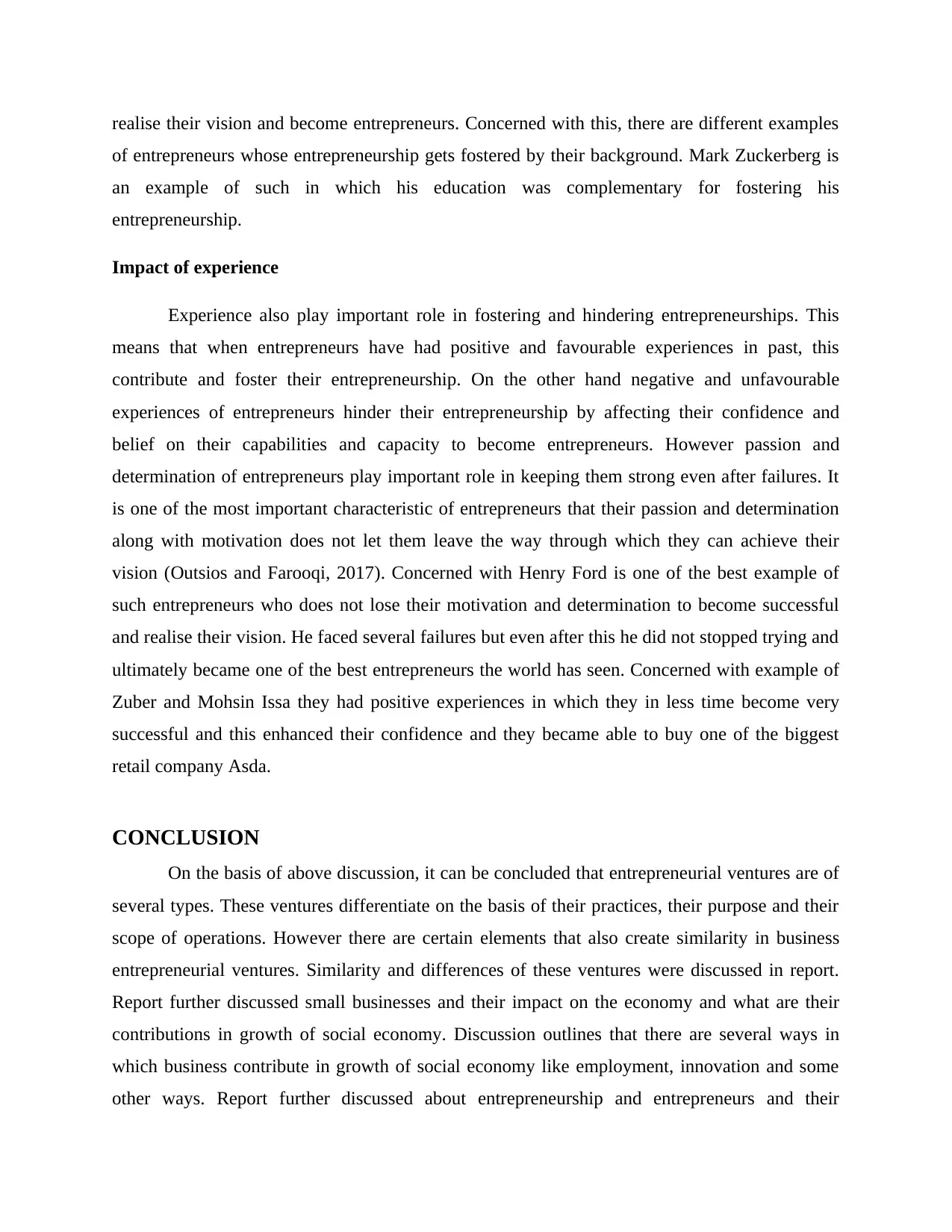
realise their vision and become entrepreneurs. Concerned with this, there are different examples
of entrepreneurs whose entrepreneurship gets fostered by their background. Mark Zuckerberg is
an example of such in which his education was complementary for fostering his
entrepreneurship.
Impact of experience
Experience also play important role in fostering and hindering entrepreneurships. This
means that when entrepreneurs have had positive and favourable experiences in past, this
contribute and foster their entrepreneurship. On the other hand negative and unfavourable
experiences of entrepreneurs hinder their entrepreneurship by affecting their confidence and
belief on their capabilities and capacity to become entrepreneurs. However passion and
determination of entrepreneurs play important role in keeping them strong even after failures. It
is one of the most important characteristic of entrepreneurs that their passion and determination
along with motivation does not let them leave the way through which they can achieve their
vision (Outsios and Farooqi, 2017). Concerned with Henry Ford is one of the best example of
such entrepreneurs who does not lose their motivation and determination to become successful
and realise their vision. He faced several failures but even after this he did not stopped trying and
ultimately became one of the best entrepreneurs the world has seen. Concerned with example of
Zuber and Mohsin Issa they had positive experiences in which they in less time become very
successful and this enhanced their confidence and they became able to buy one of the biggest
retail company Asda.
CONCLUSION
On the basis of above discussion, it can be concluded that entrepreneurial ventures are of
several types. These ventures differentiate on the basis of their practices, their purpose and their
scope of operations. However there are certain elements that also create similarity in business
entrepreneurial ventures. Similarity and differences of these ventures were discussed in report.
Report further discussed small businesses and their impact on the economy and what are their
contributions in growth of social economy. Discussion outlines that there are several ways in
which business contribute in growth of social economy like employment, innovation and some
other ways. Report further discussed about entrepreneurship and entrepreneurs and their
of entrepreneurs whose entrepreneurship gets fostered by their background. Mark Zuckerberg is
an example of such in which his education was complementary for fostering his
entrepreneurship.
Impact of experience
Experience also play important role in fostering and hindering entrepreneurships. This
means that when entrepreneurs have had positive and favourable experiences in past, this
contribute and foster their entrepreneurship. On the other hand negative and unfavourable
experiences of entrepreneurs hinder their entrepreneurship by affecting their confidence and
belief on their capabilities and capacity to become entrepreneurs. However passion and
determination of entrepreneurs play important role in keeping them strong even after failures. It
is one of the most important characteristic of entrepreneurs that their passion and determination
along with motivation does not let them leave the way through which they can achieve their
vision (Outsios and Farooqi, 2017). Concerned with Henry Ford is one of the best example of
such entrepreneurs who does not lose their motivation and determination to become successful
and realise their vision. He faced several failures but even after this he did not stopped trying and
ultimately became one of the best entrepreneurs the world has seen. Concerned with example of
Zuber and Mohsin Issa they had positive experiences in which they in less time become very
successful and this enhanced their confidence and they became able to buy one of the biggest
retail company Asda.
CONCLUSION
On the basis of above discussion, it can be concluded that entrepreneurial ventures are of
several types. These ventures differentiate on the basis of their practices, their purpose and their
scope of operations. However there are certain elements that also create similarity in business
entrepreneurial ventures. Similarity and differences of these ventures were discussed in report.
Report further discussed small businesses and their impact on the economy and what are their
contributions in growth of social economy. Discussion outlines that there are several ways in
which business contribute in growth of social economy like employment, innovation and some
other ways. Report further discussed about entrepreneurship and entrepreneurs and their

characteristics traits and their skills that differentiate them from business managers. Discussion
outlined that entrepreneurs and managers are significantly different from each other. Report
further discussed what are the elements of personality that reflect motivation and mindset of
entrepreneurs and fostering and hindering entrepreneurships.
outlined that entrepreneurs and managers are significantly different from each other. Report
further discussed what are the elements of personality that reflect motivation and mindset of
entrepreneurs and fostering and hindering entrepreneurships.
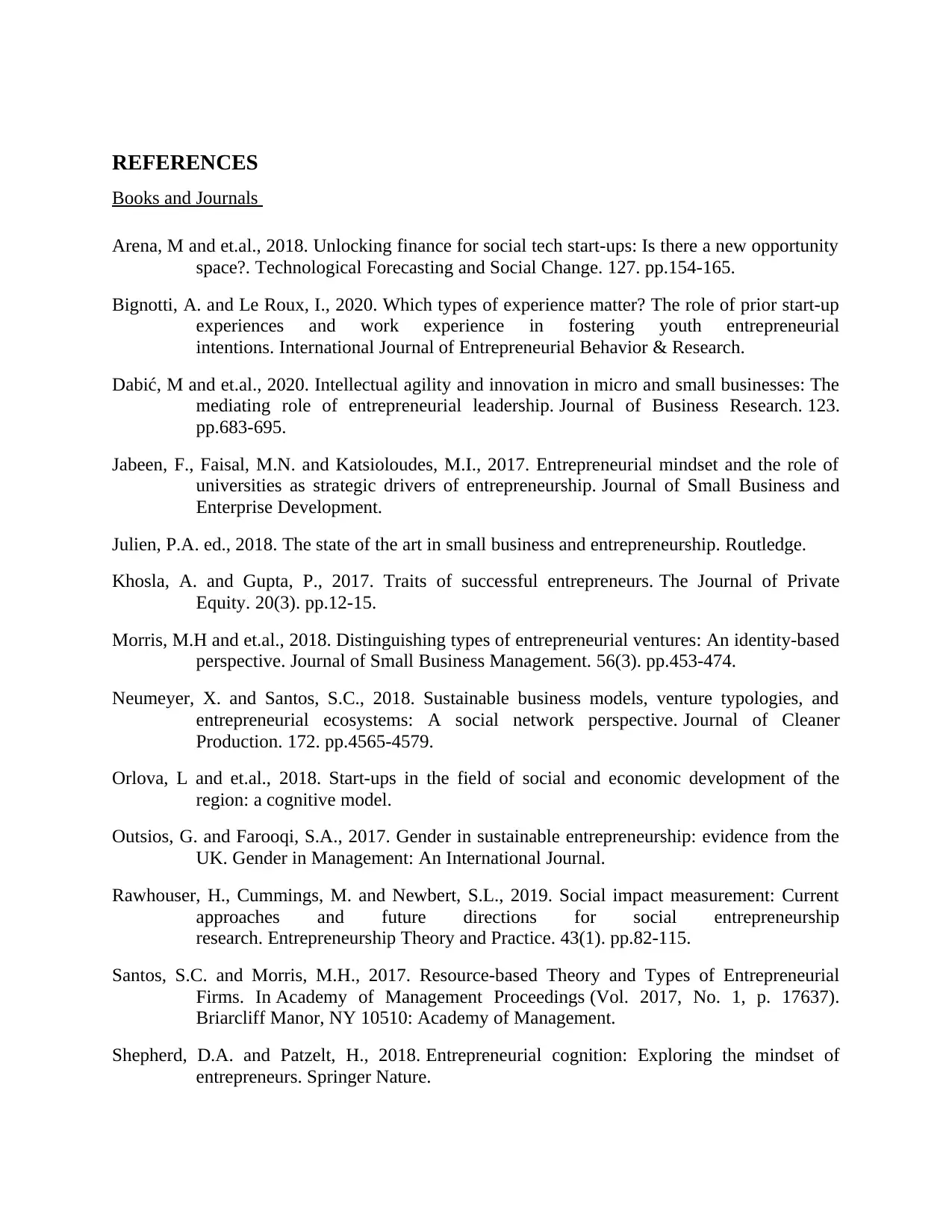
REFERENCES
Books and Journals
Arena, M and et.al., 2018. Unlocking finance for social tech start-ups: Is there a new opportunity
space?. Technological Forecasting and Social Change. 127. pp.154-165.
Bignotti, A. and Le Roux, I., 2020. Which types of experience matter? The role of prior start-up
experiences and work experience in fostering youth entrepreneurial
intentions. International Journal of Entrepreneurial Behavior & Research.
Dabić, M and et.al., 2020. Intellectual agility and innovation in micro and small businesses: The
mediating role of entrepreneurial leadership. Journal of Business Research. 123.
pp.683-695.
Jabeen, F., Faisal, M.N. and Katsioloudes, M.I., 2017. Entrepreneurial mindset and the role of
universities as strategic drivers of entrepreneurship. Journal of Small Business and
Enterprise Development.
Julien, P.A. ed., 2018. The state of the art in small business and entrepreneurship. Routledge.
Khosla, A. and Gupta, P., 2017. Traits of successful entrepreneurs. The Journal of Private
Equity. 20(3). pp.12-15.
Morris, M.H and et.al., 2018. Distinguishing types of entrepreneurial ventures: An identity‐based
perspective. Journal of Small Business Management. 56(3). pp.453-474.
Neumeyer, X. and Santos, S.C., 2018. Sustainable business models, venture typologies, and
entrepreneurial ecosystems: A social network perspective. Journal of Cleaner
Production. 172. pp.4565-4579.
Orlova, L and et.al., 2018. Start-ups in the field of social and economic development of the
region: a cognitive model.
Outsios, G. and Farooqi, S.A., 2017. Gender in sustainable entrepreneurship: evidence from the
UK. Gender in Management: An International Journal.
Rawhouser, H., Cummings, M. and Newbert, S.L., 2019. Social impact measurement: Current
approaches and future directions for social entrepreneurship
research. Entrepreneurship Theory and Practice. 43(1). pp.82-115.
Santos, S.C. and Morris, M.H., 2017. Resource-based Theory and Types of Entrepreneurial
Firms. In Academy of Management Proceedings (Vol. 2017, No. 1, p. 17637).
Briarcliff Manor, NY 10510: Academy of Management.
Shepherd, D.A. and Patzelt, H., 2018. Entrepreneurial cognition: Exploring the mindset of
entrepreneurs. Springer Nature.
Books and Journals
Arena, M and et.al., 2018. Unlocking finance for social tech start-ups: Is there a new opportunity
space?. Technological Forecasting and Social Change. 127. pp.154-165.
Bignotti, A. and Le Roux, I., 2020. Which types of experience matter? The role of prior start-up
experiences and work experience in fostering youth entrepreneurial
intentions. International Journal of Entrepreneurial Behavior & Research.
Dabić, M and et.al., 2020. Intellectual agility and innovation in micro and small businesses: The
mediating role of entrepreneurial leadership. Journal of Business Research. 123.
pp.683-695.
Jabeen, F., Faisal, M.N. and Katsioloudes, M.I., 2017. Entrepreneurial mindset and the role of
universities as strategic drivers of entrepreneurship. Journal of Small Business and
Enterprise Development.
Julien, P.A. ed., 2018. The state of the art in small business and entrepreneurship. Routledge.
Khosla, A. and Gupta, P., 2017. Traits of successful entrepreneurs. The Journal of Private
Equity. 20(3). pp.12-15.
Morris, M.H and et.al., 2018. Distinguishing types of entrepreneurial ventures: An identity‐based
perspective. Journal of Small Business Management. 56(3). pp.453-474.
Neumeyer, X. and Santos, S.C., 2018. Sustainable business models, venture typologies, and
entrepreneurial ecosystems: A social network perspective. Journal of Cleaner
Production. 172. pp.4565-4579.
Orlova, L and et.al., 2018. Start-ups in the field of social and economic development of the
region: a cognitive model.
Outsios, G. and Farooqi, S.A., 2017. Gender in sustainable entrepreneurship: evidence from the
UK. Gender in Management: An International Journal.
Rawhouser, H., Cummings, M. and Newbert, S.L., 2019. Social impact measurement: Current
approaches and future directions for social entrepreneurship
research. Entrepreneurship Theory and Practice. 43(1). pp.82-115.
Santos, S.C. and Morris, M.H., 2017. Resource-based Theory and Types of Entrepreneurial
Firms. In Academy of Management Proceedings (Vol. 2017, No. 1, p. 17637).
Briarcliff Manor, NY 10510: Academy of Management.
Shepherd, D.A. and Patzelt, H., 2018. Entrepreneurial cognition: Exploring the mindset of
entrepreneurs. Springer Nature.
Secure Best Marks with AI Grader
Need help grading? Try our AI Grader for instant feedback on your assignments.
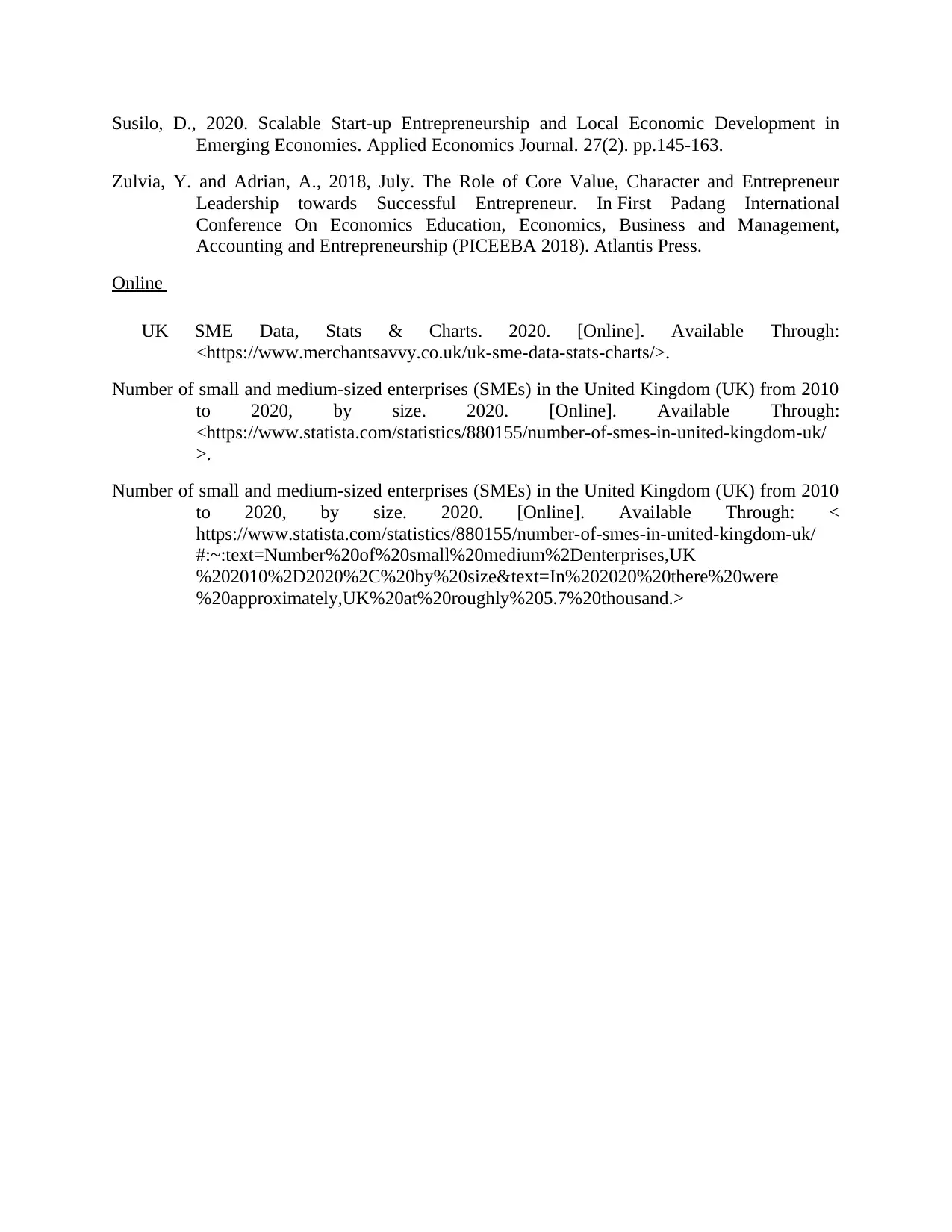
Susilo, D., 2020. Scalable Start-up Entrepreneurship and Local Economic Development in
Emerging Economies. Applied Economics Journal. 27(2). pp.145-163.
Zulvia, Y. and Adrian, A., 2018, July. The Role of Core Value, Character and Entrepreneur
Leadership towards Successful Entrepreneur. In First Padang International
Conference On Economics Education, Economics, Business and Management,
Accounting and Entrepreneurship (PICEEBA 2018). Atlantis Press.
Online
UK SME Data, Stats & Charts. 2020. [Online]. Available Through:
<https://www.merchantsavvy.co.uk/uk-sme-data-stats-charts/>.
Number of small and medium-sized enterprises (SMEs) in the United Kingdom (UK) from 2010
to 2020, by size. 2020. [Online]. Available Through:
<https://www.statista.com/statistics/880155/number-of-smes-in-united-kingdom-uk/
>.
Number of small and medium-sized enterprises (SMEs) in the United Kingdom (UK) from 2010
to 2020, by size. 2020. [Online]. Available Through: <
https://www.statista.com/statistics/880155/number-of-smes-in-united-kingdom-uk/
#:~:text=Number%20of%20small%20medium%2Denterprises,UK
%202010%2D2020%2C%20by%20size&text=In%202020%20there%20were
%20approximately,UK%20at%20roughly%205.7%20thousand.>
Emerging Economies. Applied Economics Journal. 27(2). pp.145-163.
Zulvia, Y. and Adrian, A., 2018, July. The Role of Core Value, Character and Entrepreneur
Leadership towards Successful Entrepreneur. In First Padang International
Conference On Economics Education, Economics, Business and Management,
Accounting and Entrepreneurship (PICEEBA 2018). Atlantis Press.
Online
UK SME Data, Stats & Charts. 2020. [Online]. Available Through:
<https://www.merchantsavvy.co.uk/uk-sme-data-stats-charts/>.
Number of small and medium-sized enterprises (SMEs) in the United Kingdom (UK) from 2010
to 2020, by size. 2020. [Online]. Available Through:
<https://www.statista.com/statistics/880155/number-of-smes-in-united-kingdom-uk/
>.
Number of small and medium-sized enterprises (SMEs) in the United Kingdom (UK) from 2010
to 2020, by size. 2020. [Online]. Available Through: <
https://www.statista.com/statistics/880155/number-of-smes-in-united-kingdom-uk/
#:~:text=Number%20of%20small%20medium%2Denterprises,UK
%202010%2D2020%2C%20by%20size&text=In%202020%20there%20were
%20approximately,UK%20at%20roughly%205.7%20thousand.>
1 out of 17
Related Documents
Your All-in-One AI-Powered Toolkit for Academic Success.
+13062052269
info@desklib.com
Available 24*7 on WhatsApp / Email
![[object Object]](/_next/static/media/star-bottom.7253800d.svg)
Unlock your academic potential
© 2024 | Zucol Services PVT LTD | All rights reserved.





